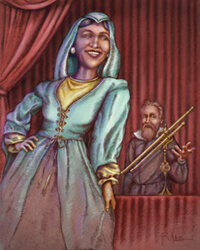All’s Well That Ends Well
I had not the slightest intention of going to graduate school when I earned my bachelor’s degree from Alabama A&M in 1960. I was headed for Broadway or Hollywood. While in college, I had played the plum role of the cannibal mother who devours her sons in Sidney Howard’s The Silver Cord, and I had also acted in seven other productions. There was no doubt in my twenty-year-old mind that I could succeed at acting as a profession.
Fate, however, had other plans. Richard Jefferson PhD’55 permitted me to audit his Shakespeare class at Alabama A&M in the fall of 1960, as I awaited work teaching at a local high school. Dr. Jefferson lived in the faculty apartments near me, and his constant cry was, “On, Wisconsin!”
So, in my first year of teaching high-school English, I sent my only extra $10 to the English department at the University of Wisconsin, where I was admitted and given a scholarship that waived out-of-state tuition.
Graduate degrees were not offered at Alabama’s historically black colleges, and as an African-American, I could not attend either of the white state institutions in Alabama. John Patterson and George Wallace, governors of Alabama in the early 1960s, had vowed to keep educational institutions rigidly segregated, so they paid African-American students to go to school out of state. Alabama Out-of-State Aid for Negroes paid first-class railroad fare (round-trip, one time), and the difference in tuition, room, and board at Alabama or Auburn and the school of one’s choice.
This policy helped Alabama evade the 1954 Supreme Court Brown v. Board of Education decision, which prohibited states from creating separate public schools for black and white children. People at Wisconsin believed Alabama’s policy was wrong, but they also believed that by attending the UW, I would obtain a superior education.
I enrolled in the master’s in English program, where I had outstanding professors. I read fascinating books, saw compelling films, and witnessed moving cultural events.
But I also experienced discouragement. One young white male professor told me, “You have ability, but no background — why don’t you go home?” Some northern students, Caucasian and African-American, made fun of my southern speech. Others in Chadbourne Hall asked me to dance for them. One white male graduate student said, in derision, “You went to Alabama Ag.” One dormitory mother remarked to my face that I dressed poorly.
But in a time when African-American students comprised one-tenth of 1 percent of the student population, I found community with Wisconsin Players. In July 1962, Director Lowell Manfull cast me as the maid in James Thurber’s The Male Animal. I met two lifelong friends, Maurine Kelber Kelly MS’63, who worked makeup, and Daniel Larner MS’62, PhD’68, who played the protagonist. Three African-American women graduate students housed in Botkin-Tripp attended and sent congratulatory cards. Judy London ’65 invited me to Thanksgiving dinner. Dan Larner or the Manfulls saw me home after rehearsals ended. The Daily Cardinal chronicled our achievements, and the local paper published a review.
In December 1962, director Ronald Mitchell cast me in three non-traditional bit roles in Bertolt Brecht’s Galileo — rare, indeed, at a time when the servant roles were often the plight of the actor of color.
But then, in June 1963, the master’s committee told me that I had failed my comprehensive examination. This was the darkest day of my life. I returned home to the news story of Governor Wallace denying Vivian Malone and James Hood admission to the University of Alabama. I studied two hours each evening, after teaching full time for six months, then re-took the exam. The committee wrote that I had passed, but recommended that I not continue on for a PhD. Reading about Joyce Carol Oates’s comparable experience in the Summer 2009 issue of On Wisconsin made me feel better. If someone of her caliber could be dismissed, then surely I should not feel ashamed.
I taught college from 1963 to 1969 at Alabama A&M, and then at the University of Texas at El Paso for five years. I ultimately went on to receive a PhD in English and Theatre at the University of Iowa and continued teaching college full time — forty years in all. I published two books in theater history, and held four summer stints with the National Endowment for the Humanities. I spoke at more than fifty venues, including the World Congress of Theatre at Stockholm and Dublin, and I held Smithsonian, Rockefeller, and Roothbert fellowships.
Wisconsin Players helped to make it all possible. Denied opportunities at the graduate level in Alabama, I found studying at a world-class university like the University of Wisconsin to be the most life-changing experience I’ve ever had.
Glenda Gill, professor emerita of drama at Michigan Technological University, lives in active retirement in Huntsville, Alabama. This essay is from an unpublished memoir, Pebbles In My Shoe: The Journey of One African-American Woman of the South in Educational Theatre.
Published in the Winter 2010 issue




Comments
Karen Pearson November 21, 2010
Congratulations, Dr. Gill, on your successes and for not being dissuaded by the discouraging realities you and other African Americans faced. I hope those who continue to inflict such pain take from your story and, similarly, Vernon Jordan’s Vernan Can Read (2001) the life-long impact of their actions. Namaste, Karen
Kisa Willis December 2, 2010
I am proud to know that you are one of the greats who helped pave the way for African Americans in theatre. Had it not been for people like you who continued to push forward despite discouragement to teach and perform in substantial roles, theatre would not be the same today. And we continue to push forward…
Heidi Bostic December 13, 2010
Bravo to “On Wisconsin” Magazine for publishing such an important article. Dr. Gill’s fortitude in the face of trials is a real inspiration to readers everywhere.
Patty Sotirin December 14, 2010
Dr. Gill’s story is one of resilience, determination, and courage. This candid account contributes critical details to the larger stories of American higher education, the University, and the Wisconsin Players.
Clyde Ruffin December 27, 2010
I am honored to serve as Chair of the University of Missouri Department of Theatre; however, it is important to note that I and many other African American theatre scholars and artists continue to encounter similar experiences that challenge our presence in the academy. Nevertheless, we are strengthened and inspired by the life and work of Dr. Glenda Gill who has been an exceptional model of educational achievement and academic excellence that transcends the obstacles of race and gender. The University of Wisconsin is to be commended for removing the barriers of injustice during a volatile period in our history that allowed a woman of grace and vision to share the gift of her brilliant mind with the world.
Mies Martin July 12, 2011
As an older Graduate Student full of doubt Glenda’s story fills me with the hope that I too can complete what I’ve started. Thank you Glenda for your words and warmth.